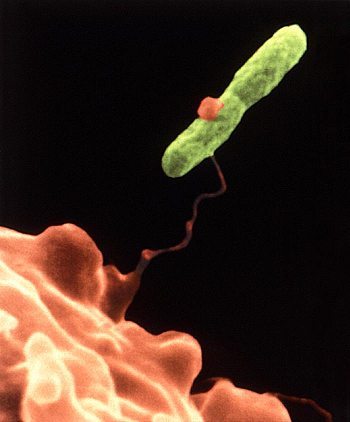Legionella Investigation in St Joseph County, Michigan
Friday March 8, 2019
The Branch Hillsdale St Joseph Community Health Agency (BHSJCHA) with support from the Michigan Department of Health and Human Services (MDHHS), is currently investigating a situation where a nursing care facility’s water system has tested positive with Legionella bacteria contamination.
In February 2019 there was one confirmed case of legionellosis associated with this facility. To date, 14 of 22 environmental water samples collected at the facility tested positive for Legionella bacteria. Based on guidance from the U.S. Centers for Disease Control and Prevention (CDC), this level of contamination indicates a potential risk to patients and visitors at the nursing care facility in St. Joseph County. An environmental assessment has been conducted and remediation has been initiated to eliminate the source of contamination. Public health agencies in Michigan have taken steps to minimize the risk of infection.

Officials at BHSJCHA, MDHHS, and the facilities operators, are working together to evaluate and remediate the situation. The facility has been directed to assess the current status of their water management program, comply with the current public health investigation and to conduct public notifications describing the possible risk of infection. The facility has also been requested to:
-
Coordinate with public health officials in support of on-site evaluation of water systems.
-
Notify clinicians of the possible facility-associated cases and remind them of appropriate patient testing requirements.
-
Conduct appropriate notification to those at possible risk of infection. This shall include risk messaging and education to patients at discharge from inpatient stays, including why they may be at risk for Legionnaires’ Disease (LD) what symptoms are, and what to do if they have these symptoms for up to 14 days post discharge. Similar communication should be sent to all patients discharged from the agency since February 1, 2019.
-
Inform the BHSJCHA immediately if they have knowledge of other LD diagnoses among patients, visitors, or staff in the facility.
Legionellosis is a respiratory infection caused by Legionella bacteria. LD is a more severe infection that includes symptoms of fever, cough, and radiologic findings consistent with pneumonia. A milder form of legionellosis, Pontiac Fever, is an influenza-like illness without pneumonia that resolves on its own. Legionella bacteria are naturally occurring in fresh water sources. The organism can multiply in man-made water systems such as cooling towers, decorative fountains, hot tubs, and large building plumbing systems. After Legionella grows and multiplies in a building water system, water containing Legionella can spread in droplets small enough for people to breathe in. People can get LD or Pontiac Fever when they breathe in small droplets of water in the air that contain the bacteria. There is greater concern with the identification of these exposures in hospitals and healthcare facilities because they service a population that is particularly vulnerable, and they provide care in an environment that has potable water systems that are often large and complex (with greater opportunity for bacterial growth and dispersion).
Individuals at higher risk for LD include those who are age 50 or older; have a current or past smoking history; or have an underlying illness or condition such as chronic lung disease, kidney or liver failure, diabetes, systemic malignancies, or immune system disorders due to medications or disease. Recent travel and overnight stays in hospitals or other healthcare facilities can increase an individual’s risk for LD.
Patients with pneumonia should be tested for LD if they have any of the following histories:
-
Have failed outpatient antibiotic treatment for community-acquired pneumonia
-
Are immunocompromised
-
Are admitted to the ICU
-
Have traveled within 10 days prior to symptom onset
-
Were recently hospitalized within the last 10 days
-
Developed pneumonia ≥48 hours after hospital admission.
Further information regarding LD is available from the CDC website visit site
If you have any questions regarding this notice, please do not hesitate to contact BHSJCHA at 517-279-9561 ext. 143 or call MDHHS Communicable Disease Division at 517-335-8165.
